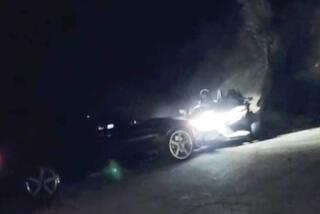2nd Felon Tied to Firm Involved in B of A Loss
- Share via
A second felon has been named in court documents as a key figure in one of the insurance companies that guaranteed the faulty mortgage securities involved in the recent $95-million loss write-offs by BankAmerica Corp.
The man is Richard Ashley Parker, of Orange County, who was convicted in state court in 1982 of grand theft and securities fraud violations involving a scheme to establish a Bahamian spa.
Court files in the case state that the spa was billed as an outlet for a synthetic hormone called LHRH, “which some magazine articles claimed had a rejuvenation effect” and for which claims also were made that it “could cure human impotence and be used in animal husbandry.”
Parker, who is in his early 60s, is free on bond pending a March 21 hearing on his motion for a reduction of his three-year state prison sentence in Northern California.
Kent B. Rogers, convicted in a separate case unrelated to the BankAmerica situation, is the other felon who, according to suits brought by the states of Texas and Delaware, played a leading role in insurance for complex real estate financing deals that have resulted in huge losses for the nation’s largest bank.
Rogers, who this week began serving a six-month federal prison term at Lompoc, Calif., for a 1981 bankruptcy fraud conviction, has denied any wrongdoing in the BankAmerica case.
Early last year, Parker was chairman of Pacific American Group Inc., the San Francisco-based parent of Pacific American Insurance Corp. of Delaware, according to a lawsuit filed recently in U.S. District Court in San Francisco by the liquidator of Dover Insurance Co. Ltd. of Bermuda, a Pacific American affiliate.
The Dover suit, as well as suits by insurance regulators in Texas and Delaware, allege that Rogers, through his Orange-based West Pac Corp. and a trust, gained control of the Pacific American firms shortly afterward, when they failed to repay $2.5 million in purported loans from West Pac. Rogers has denied that he exercised control over Pacific American Insurance.
In another suit, filed last August by the Texas receiver for Pacific American Insurance, a former officer of the company is quoted as saying that Rogers took control of the company’s headquarters in Salt Lake City last July, and that Parker accompanied him.
Rogers then created an “executive advisory committee” to run the company and designated Parker as his representative “to oversee general business policies and operations,” according to the statement by former officer Rolando I. Galano.
Parker, who was not a defendant in either lawsuit, could not be reached for comment Friday. A secretary at Rogers’ West Pac office said Parker would not be back until Monday.
The civil suit filed by Texas alleges that Rogers used West Pac and Pacific American Insurance as part of a fraudulent scheme to inflate the value of condominiums in Houston and use them as the basis for mortgages.
The mortgages provided collateral for securities sold as investments to savings institutions, the suit said. Bank of America was the escrow agent and trustee for the securities.
Parker has frequently been investigated by state and federal agencies. Hewas fined about a year ago when he pleaded guilty to federal securities fraud in a San Diego case.
He was in the national spotlight in 1975 when he sought to buy control of United Founders Life Insurance Co. of Oklahoma City, a company financed by the Teamsters Central States Pension Fund.
Oklahoma authorities turned down his bid after disclosure that the $750,000 he was to pay was obtained from a Nevada bank loan guaranteed by Las Vegas casino operator Morris Shenker.
According to the Dover lawsuit, published reports at the time cited “his close association and links with major organized crime figures and Mafia-related enterprises.”
The case in which he has been sentenced to prison stemmed from an investigation by the special prosecutions unit of the California attorney general and the state Department of Corporations. He was convicted June 22, 1982, after a four-week jury trial in Santa Clara Superior Court in San Jose. The state appeals court upheld his conviction on four felony charges.
More to Read
Inside the business of entertainment
The Wide Shot brings you news, analysis and insights on everything from streaming wars to production — and what it all means for the future.
You may occasionally receive promotional content from the Los Angeles Times.










